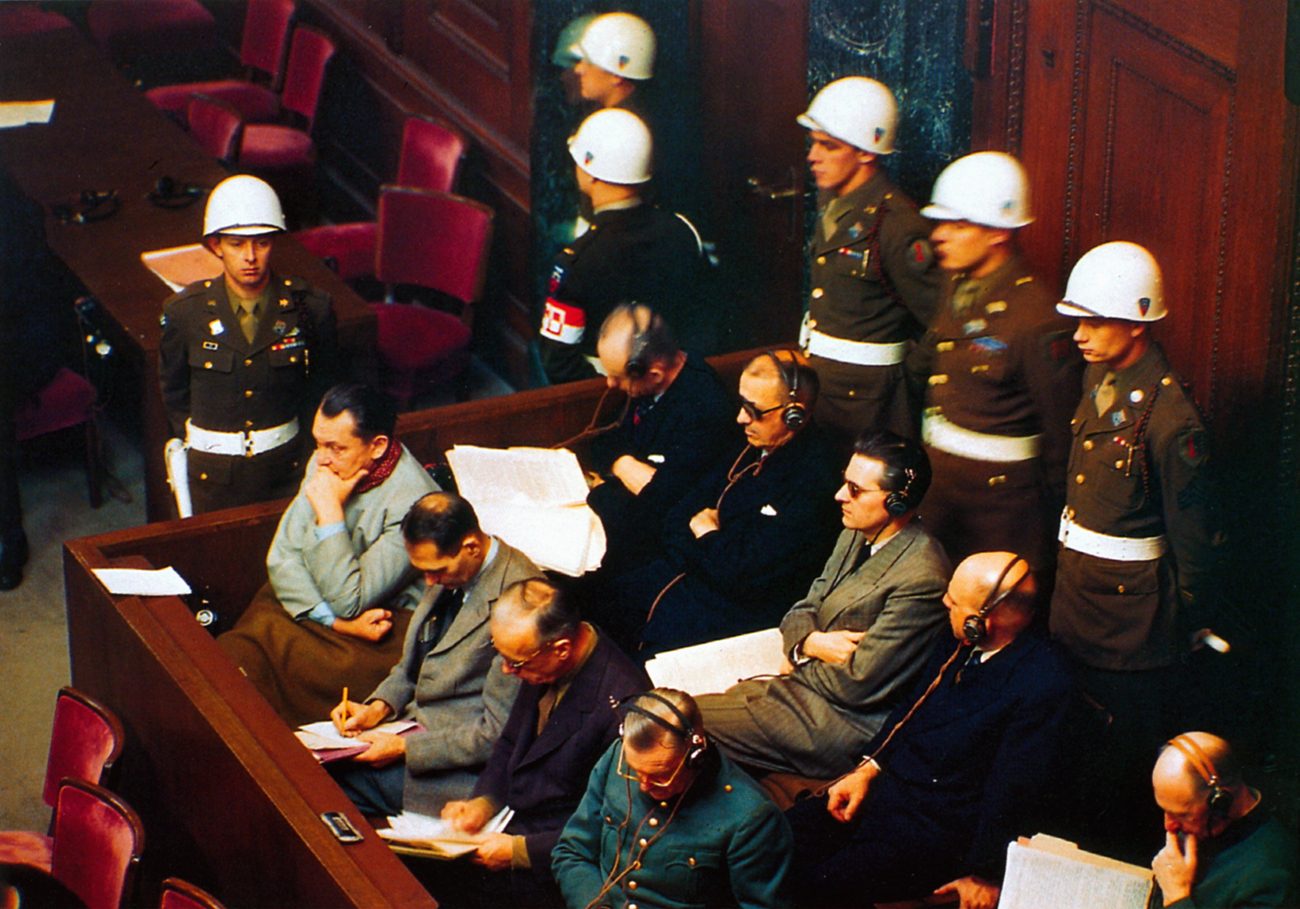
First row from left: Hermann Goering, Rudolf Hess, Joachim von Ribbentrop, Wilhelm Keitel during the trial of war criminals in Nuremberg.
UllsteinBild/Vostock-PhotoThat the leaders of the Third Reich and Nazi state institutions would be tried for war crimes was not as obvious during the years of World War II as it seems today. Initially, only Soviet officials pushed for organizing trials, while British and American leaders suggested a different approach.
In October 1942, the Soviet Foreign Ministry wrote a note saying that Moscow was in favor of "handing over the heads of Fascist Germany to the court of a special international tribunal for punishment according to all the severity of the criminal code." The next month, British Foreign Secretary Anthony Eden wrote in instructions to British Ambassador in Moscow that the idea of formally trying the main criminals such as Adolf Hitler and Benito Mussolini was pointless "because their crimes and responsibility are too great to be reviewed by a juridical procedure."
As part of the Third Moscow Conference in Fall 1943, foreign ministers from the U.S. the UK and the Soviet Union signed an agreement committing to bringing to justice "German officers and men and members of the Nazi Party who have been responsible for atrocities, massacres and executions,” but at that time it was assumed that the leaders would be tried in the countries in which they had committed crimes. At the Potsdam Conference in Summer 1945, Joseph Stalin, Winston Churchill, Harry S. Truman and Charles de Gaulle agreed that an international military tribunal should be set up to try the leaders of Nazi Germany for war crimes.
Russian historian Natalya Lebedeva speculates that the U.S. and the UK were against the court because the "accused would refer to the not-so-flawless pre-war policies of the Western nations, their assistance in rearmament, the Munich maneuvers, etc." They were also concerned that there weren’t enough legal grounds for trying the Nazis and the verdicts would appear handed down by a kangaroo court.
In the view of historian Boris Sokolov, the Soviet Union was pressing hard for the court format in an attempt to increase the country's international prestige and present an example of countries working within the framework of a new, international law that could be drawn upon in the future.
The defendants charged in the Trial of Major War Criminals doubted the impartiality of the judges. In the words of Luftwaffe head Hermann Goering, "The victor is always the judge and the loser, the accused."
Although the many scholars who have examined the trials in retrospect have found flaws in the proceedings, they are generally considered to have been fair. Each accused had a lawyer — 27 lawyers in total represented the defendants. Additionally, the fact that not all the accused received death sentences speaks to the fairness of the proceedings. Of the original 24 defendants charged, 12 were sentenced to death by hanging, seven received prison sentences and three were acquitted. Robert Ley and Hermann Goering, committed suicide during the proceedings. An additional defendant, Nazi party boss Martin Bormann, had been charged and tried in absentia. It was later determined that he had committed suicide.
The Soviet Union protested the acquittals of Hjalmar Schacht, who had been president of the Reichsbank and the Nazi Economy Minister; Hans Fritzsche, a propaganda official, considered Goebbels' right-hand man; and Franz von Papen, Hitler's vice-chancellor.
Moscow was also displeased by the fact that the SA, the Reich Cabinet and the General Staff of the High Command were not recognized as criminal organizations by the tribunal. The groups recognized as criminal organizations were the Leadership Corps of the Nazi Party, the SS, the Gestapo and the SD.
At a recent roundtable organized by the Russian Historical Society, historian and Duma deputy Vyacheslav Nikonov, who is also the grandson of Soviet Foreign Minister Vyacheslav Molotov, said that the Nuremberg tribunal was also mistaken in not recognizing the Ukrainian Insurgent Army and the 1st Galician Division as criminal organizations despite the obvious links that these groups had with the Nazi regime.
Adolf Hitler and Joseph Goebbels committed suicide in the last days of the war and Heinrich Himmler killed himself in late May, after the Nazi surrender.
Josef Mengele, the “Angel of Death” who was best known for conducting experiments on prisoners at Auschwitz, eluded capture and was therefore not tried at Nuremberg. He drowned in Brazil in 1979.
Adolf Eichmann, who was responsible for mass deaths of Jews, also avoided the Nuremberg tribunal by escaping to South America. He was later captured in Argentina by the Mossad, the Israeli intelligence service, and tried and hanged in Israel in 1962.
SS saboteur Otto Skorzeny, who freed Mussolini and prepared an assassination attempt on Yugoslav leader Joseph Broz Tito, was tried at a war crimes tribunal at Dachau in 1947 and acquitted. In the 1950s and 1960s, he was involved in a number of paramilitary operations, including for the Mossad. He was denazified in absentia in 1952.
The tribunal brought a legal end to the Nazi regime and set an important precedent for trying other defendants for crimes committed during the war. After the Nuremberg trials, almost 70,000 Nazis and their accomplices were tried in Germany and other countries for wartime actions.
The Nuremberg tribunal created the foundations for international criminal law and set a precedent for such organizations as the International Criminal Court and the International Court of Justice. The charter for the International Military Tribunal at Nuremberg legally defined a crime against humanity and set standards for punishment for such crimes in accordance with international norms.
All rights reserved by Rossiyskaya Gazeta.
Subscribe
to our newsletter!
Get the week's best stories straight to your inbox